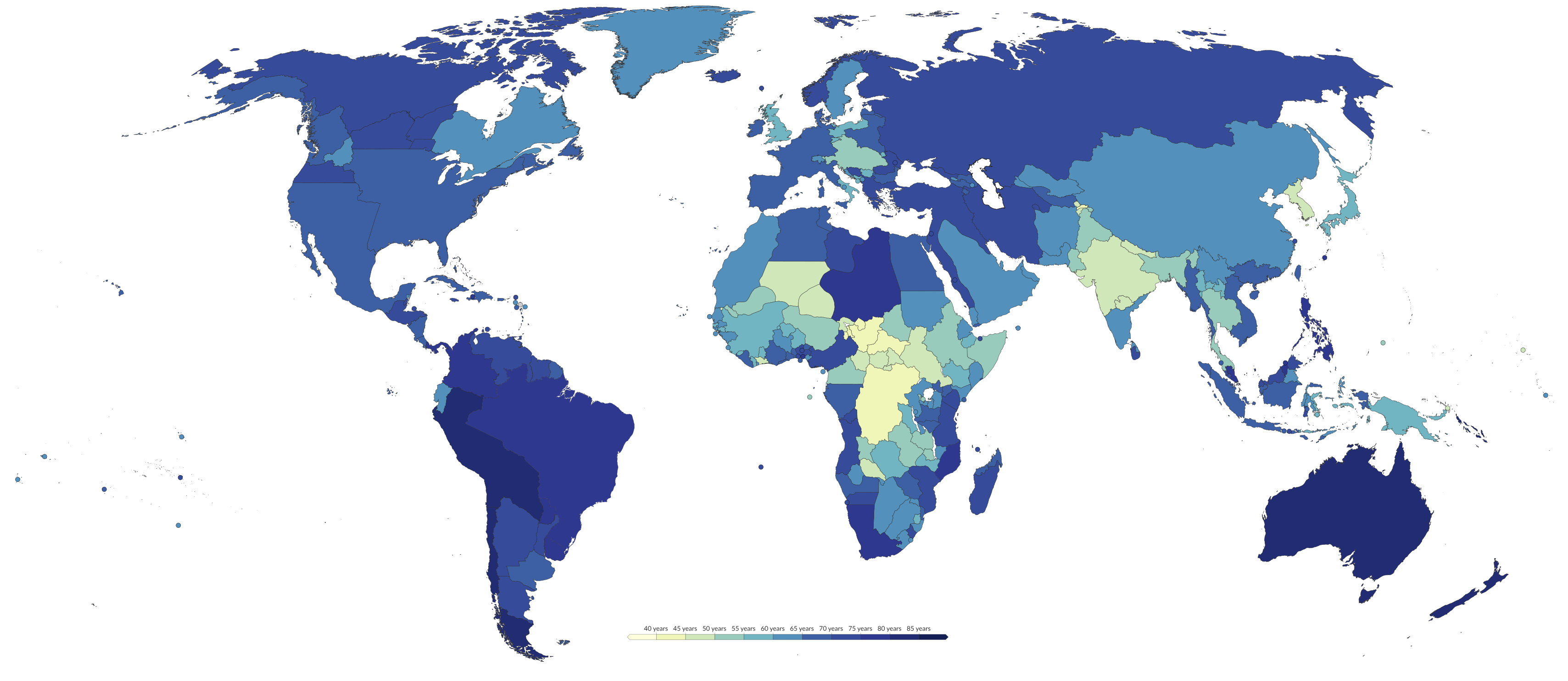You are using an out of date browser. It may not display this or other websites correctly.
You should upgrade or use an alternative browser.
You should upgrade or use an alternative browser.
Changing of the Seasons: an Independent Oregon TL
- Thread starter tae_will21
- Start date
Departments of Oregon
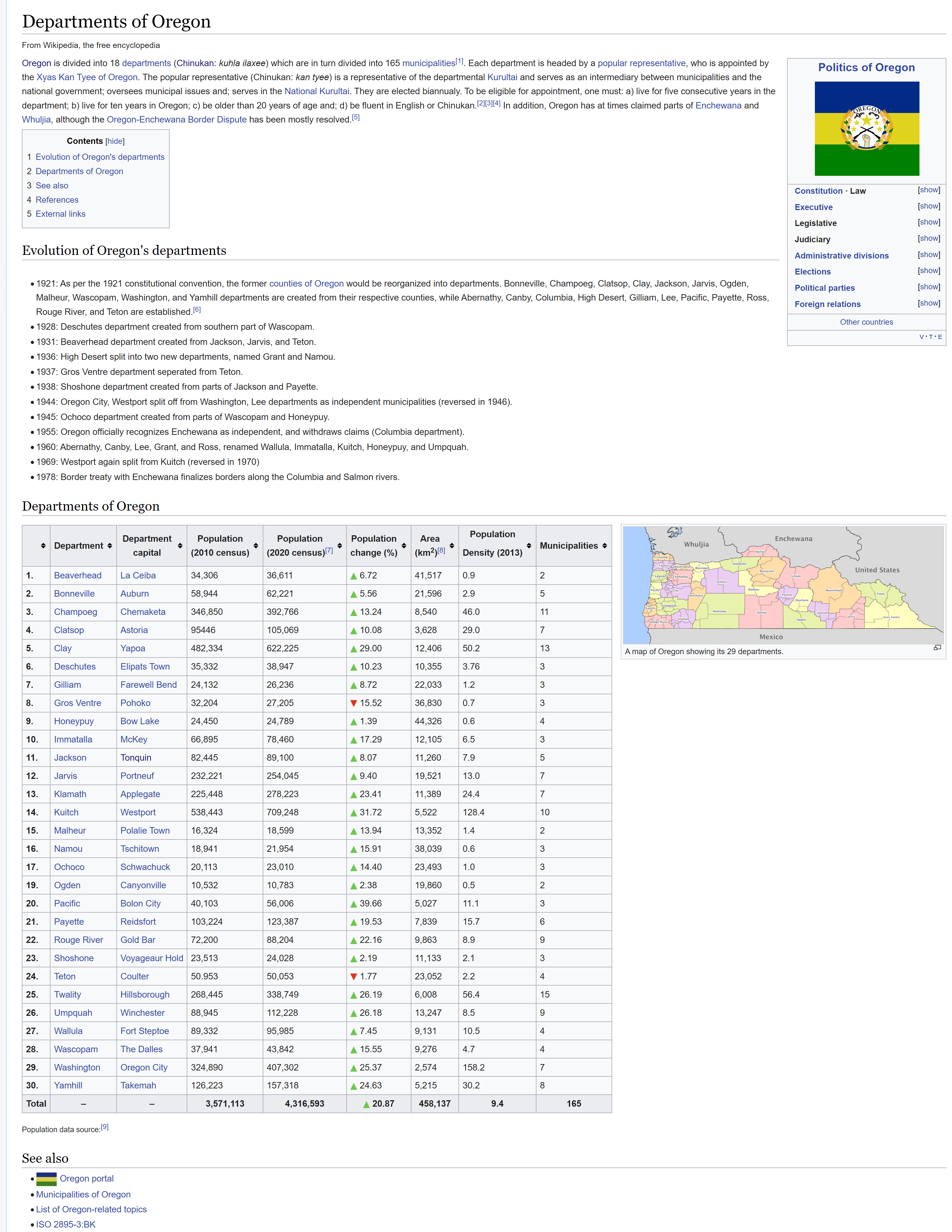
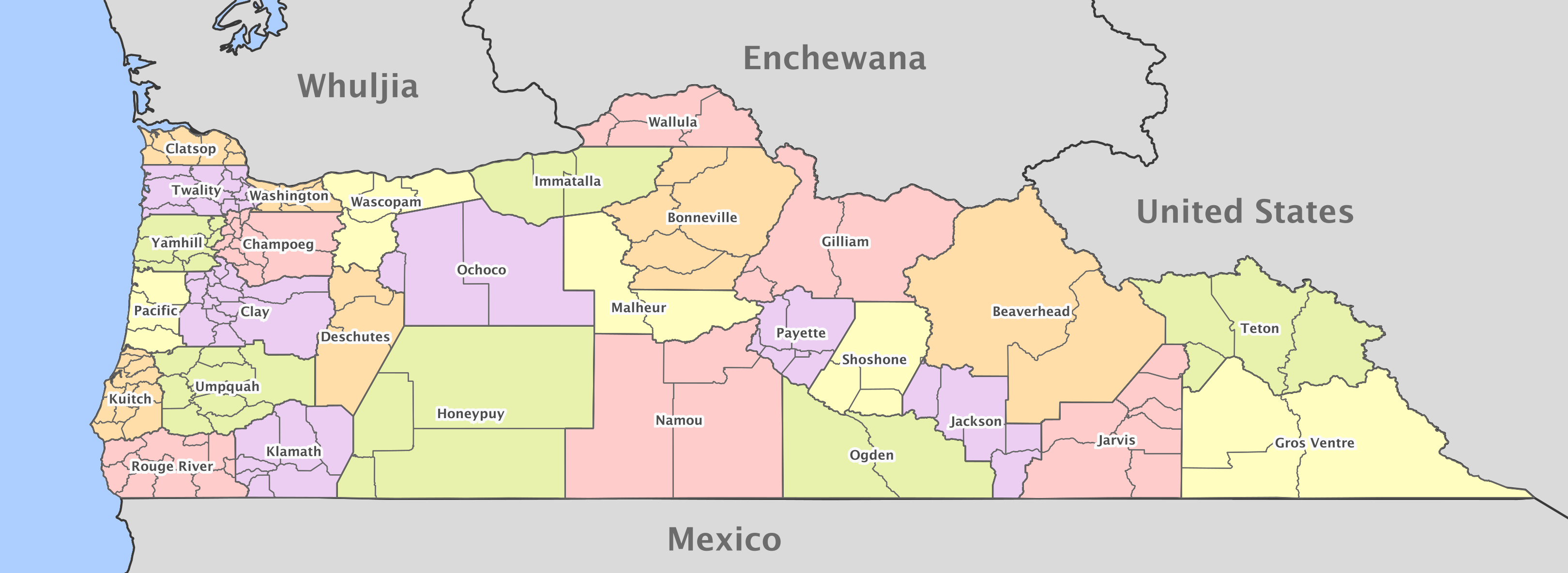
First look at the star of our story, the Republic of Oregon. Founded in 1864 from the remains of Oregon Territory, the Republic of Oregon (Chinukan: Konomoxt Oregon) is a large Kutultai Republic in North America. In the present day, Oregon has a population of close to 4.5 million and growing. The principal ethnic groups of Oregon are Oregonians, descendants of early settlers who speak Chinukan, Anglo-Californians, who speak Californian English and live mostly in the Klamath and Umpquah departments, and Americans, who speak English and live mostly in the sparsely-population Eastern Oregon. In recent years, there have also been many Asian immigrants to Oregon, with Asians now making up a plurality of the population in Kuitch department. Three-fourths of the population is located West of the Cascade range, concentrated around Westport and the Willamette Valley.
Last edited:
Rio becomes a major financial center and gains a lot of European immigration, Sao Paulo is still the second largest city in Brazil with close to 10 million people, Petropolis is actually OTL St. Petersburg (renamed during during the fall of the Russian monarchy). Pétropolis in Brazil is still a large city though, it's actually the capital of the Rio de Janeiro state, with Rio itself being a federal districtOnly now did I notice that Rio de Janeiro's metro area has ITTL a whopping 21(!) million people. In comparison, IOTL it has about 11-12 million inhabitants in the Greater Rio area... it is fascinating to imagine how a much more populous Rio de Janeiro would be, although it makes me wonder what happened to São Paulo for it to not even be the second-largest metro area in Brazil (which is surprisingly occupied by Petrópolis, a medium-sized city IOTL)
As the British Empire collapsed in the waning years of the Great War, many Indian rebel groups and organizations found themselves suddenly in control of large areas. When the British unilaterally withdrew, these movements filled the gap and fought each other for dominance over the next decade, a period of time called the Indian War or Indian Wars. In the end, Hindu Nationalists consolidated central India, Sikhs and Punjabi Muslims aligned with the Central Asian Prismatic League held on to parts of the North, Bengal and South India formed under communalist and socialistic groups, and some princely states were co-opted by local nationalist movements (Mulkistan in hyderabad, Sindh and Kalat for Sindhis and Balouchis).Could you tell us about the Indian War?
Thanks ! I plan to make updates for all the major countries. It's actually quite interesting how the US began to project power in the pacific OTL before they settled the West Coast, although the ITTL Hoorn Islands are pretty far from the US base of power and function as a de facto pacific naval baseThis is insane (affectionate). I really am looking forward to seeing more about the B.N.E.E. and to learn how colonialism in Africa and the Pacific happened. For example I find it really fascinating that the US, despite lacking a Pacific coastline, has managed to gain a collection of islands in the region, as well as gaining parts of OTL's Gambia (which I like to imagine as being a purchase of the territory from the British in a secondary attempt of a Liberia).
2022 Oregon Kurultai Election



This is a new Article from the Westport SĪNANĪTCHISH, one the main newspapers in Oregon and one of the largest representing the Liberal Ameliorians. (SĪNANĪTCHISH means (those who)watch the sea in Chinukan, and represented a word for cosmopolitan Westport residents who during the Gatch dictatorship in the early 20th century would ''look out to sea'' for foreign intervention in their county; when this did come and the Liberals overthrew the regime in the 50s, the Westport Daily renamed itself) - also your first look at Chinukan, and the orthography I used for it
What are you using to translate into Chinook? Is there an online dictionary or translator?
Ooh, very interesting tidbits on the side. So Kurultai democracy also inherits the feasting from the Mongolian equivalent?
The blend of influences must make Oregonian Kurultai staples quite appetizing, to say the least.
In addition, how globally popular is Kokpar? I'd assume it's a staple of TTL's Great Plains, but it might be similar to polo in spreading to regions with less pastureland.
Regarding Chinookan, is the country digraphic in Duployan and Latin, and how much of the lexicon still traces itself back to French?
(I'd imagine some of the initial loanwords might've become antiquated, but the BNEE's global prominence probably leads to a ton of new introductions.)
The blend of influences must make Oregonian Kurultai staples quite appetizing, to say the least.
In addition, how globally popular is Kokpar? I'd assume it's a staple of TTL's Great Plains, but it might be similar to polo in spreading to regions with less pastureland.
Regarding Chinookan, is the country digraphic in Duployan and Latin, and how much of the lexicon still traces itself back to French?
(I'd imagine some of the initial loanwords might've become antiquated, but the BNEE's global prominence probably leads to a ton of new introductions.)
Selected Oregonians
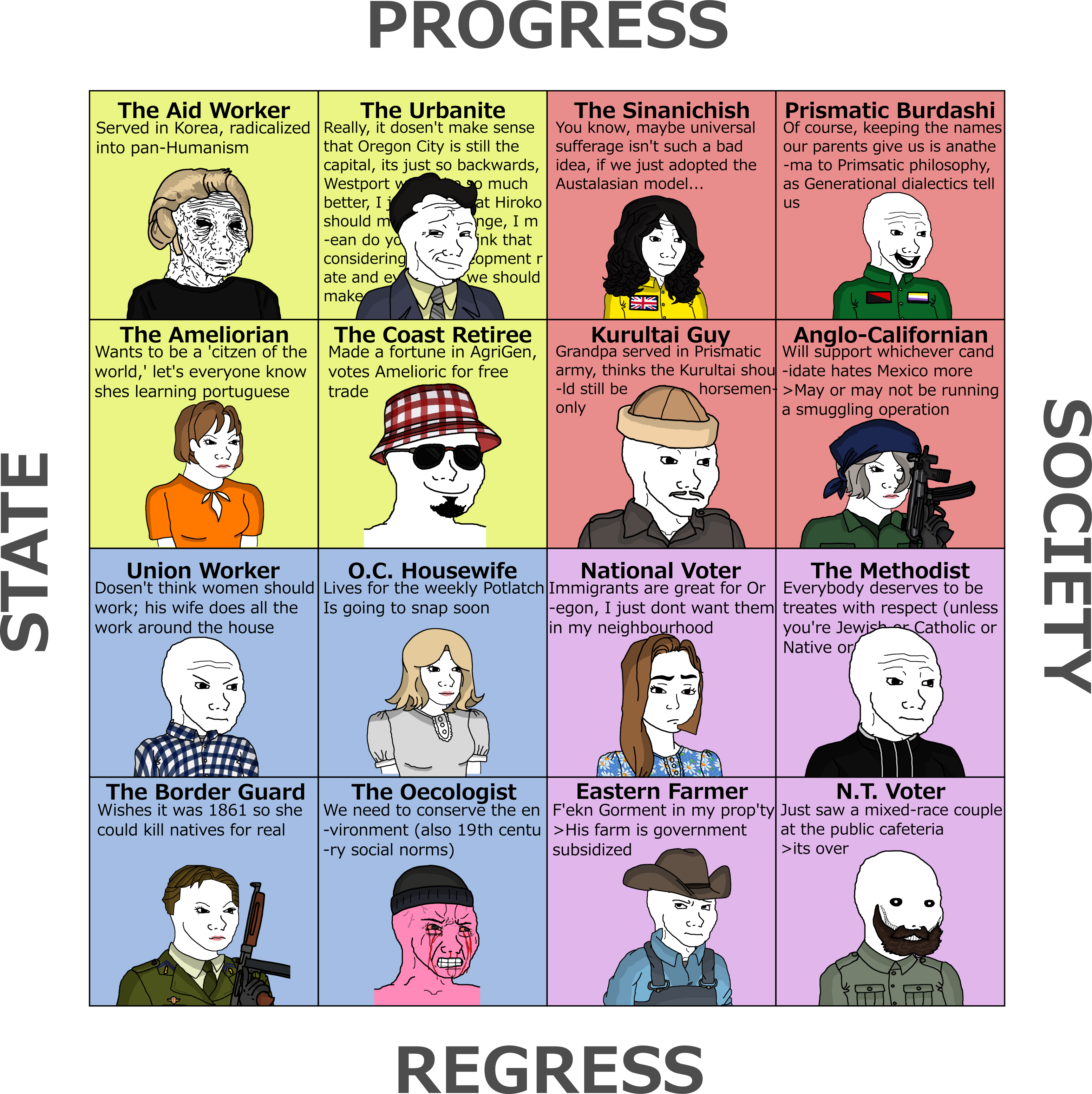
Kind of stupid, but I made a wojak compass thing to give a better look at the dynamics of the Oregonian political system. The Axes are for those favoring societal dynamism compared to tradition, and those favoring state institutions compared to societal ones.
Nawitca Tilikum Voter: He grew up in rural Clatsop, and listened intently to his grandfather's stories of the ‘59 war with Whuljia. Masked his insecurities and desire for acceptance by being insanely racist with his fellow nationalists. Actually believes in the concept of ‘conquest marriages’ (as bad as it sounds). He totally admires the army, but won’t actually join, instead working at a local factory. He brags to his friends at the cafeteria about the one time he faced off against a ‘savage native’ (they were on opposite sides of the Columbia river).
Eastern Farmer: He was born in Ochoco department, and has only left once in his life, to go to a fair in the Dalles. His whole family would vote Nationalist if they could. Opposes the single tax, and wishes that the ‘Big-city Westport fat cats’ could get their hands out of his business. He receives large subsidies paid for by Westport manufacturing output. Is vaguely put out about the idea that his crops are being sent to famine relief in Korea, although he won’t specify why. Speaks a mixed dialect of English and Chinukan that would give a Westerner an aneurysm.
Oecologist: Born outside of Chemaketa near the Cascades, his formative experience was from his time in the Oregon Wilderness Scouts, which drilled into him love for the environment (and hazing solidarity). He was enraptured by malthusian arguments pumped out by the French Oecology movement of the ‘00s. He was pushed away from the Ameliorians and Nationals because of their immigration policy, which he cloaks in arguments over sustainability. He secretly admires the total closed-border policy of Enchewana and wishes Oregon could do the same. Saw a same-sex couple on trail one time and to take deep breaths to calm down.
Border Guard: she was born in Portland, and educated by stories of the heroic Oregonians of Willamette valley history. Was disconsolable when she wasn’t able to join the Wilderness Scouts, spent her time reading Pioneer Tales and watching The Last Stand!. Joined the army out of school, whose culture perpetuated her personal siege mentality. Hates Whuljia, the US, and Mexico with a passion. She secretly wishes it was 1861 so she could go into battle with the original Oregon Rifles (women were not allowed in the Oregon Rifles).
Methodist: He was born to middle class hard-working immigrant parents from California, disappointed them by joining the ministry instead. Avoids cafeterias and potlatches, tends to private works of charity which make him feel better about himself. Guilt complex drives his sense of moralism. He is very kind and accepting to anyone (as long as they’re protestant, will become more racist than you can imagine regarding Catholics, Jews, and Enchewaneans). Wants to go on a mission to Whuljia to ‘civilize the noble savage’ (Whuljians are 90% Christian).
National Party Voter: She grew up in Fort Boise and loves Oregon. She thinks that everyone should have the right to become an Oregonian, even immigrants (not natives, obviously). When her daughter made friends with the children of a Japanese family, she told her not to eat their ‘ethnic’ food. Lobbies with other ‘Wives of Boise’ at local potlatches to not have ‘undesirable elements’ move into their city. Racially prejudiced against Asians, Americans, Mexicans, and ‘mixed-blood’ people from Teton.
Oregon City Housewife: Born in Yapoa, she never went to highschool, instead working from a young age at cafeterias and newspapers. Her marriage has yet to morph into the Caiapora romance novels she read as a kid, but more of an Encantado. She lives for her weekend potlatches with friends, and spends the rest of time doing housework and self-medicating for stress. She lives vicariously for her daughter, who may or may not resent her for it in the future.
Union Worker: Grew up in the staunchly union-working dockside neighborhood in Port Orford to a poor family. Taught from a young age by his parents to be responsible and work for himself, internalized it with intense misogyny. Went to trade school, works now in a factory on the Alsea, spends his union-won extra hours in the cafeteria trying to convince his union leader to vote Worker’s at the next Kurultai (he will vote Ameliorian) because he longs for a world where ‘no women has to work, and they can stay at home where they belong.’ (his wife does all the housework, which he doesn't consider work because it's unpaid).
Anglo-Californian: her ancestors lived in California since the 1860s, and were forced to flee after the first rebellion in ‘54. Can’t speak Chinukan, and can barely understand American Standard English. Lives in Rouge River in a mostly-Californian town at a lumber mill that may or may not be a secret weapons smuggling scheme. Will urge her local delegate to vote for whoever has the harshest stance against Mexico. She’s still mad about how America abandoned the Californian rebels during the Great War.
Kurultai Guy: Grew up in Cincinnati, Yamhill. His grandfather fought in the prismatic army. He loves horses, and has been to every Lee City Kokpar game for the last 8 years. He thinks that the country would be better off if everyone lived a nomadic life like a ‘true prismatic warrior.’ During his childhood, he longed to be a runner at the WorldGames like his idol, Joaquim Cruz. Since his failure to find success in running, he puts an unhealthy amount of pressure on his son to be good at sports, which will lead to the latter resenting all physical exercises.
Coast Retiree: Born in Umpquah City, he made a fortune in Eastern agriculture. Now spends his time lobbying the government to increase R&D funding into Gemulaic development. Bought oceanside property in the Yamhill coast where he holds get-togethers with his estranged family, and spends his summers fishing in Patagonia with his Brazilian work buddies. Opposes immigration and social change, but will vote Ameliorian anyway for free trade and immigration. He thinks Brazilian NGOs should ‘open up’ Whuljia and Enchewna to ‘development.’
Ameliorian: Despite being born and raised in Portneuf, she is a very progressive person. Her parents taught her to think for herself (while providing an Ameliorian perspective), and she’s always been the one to play devil's advocate in conversation. She thinks Kokpur is violent and brutish, and watches the slightly-less violent Calcio instead. Has a bookshelf full of foreign books, and delights in letting her friends know she’s learning portuguese. Wants Oregon to lower all trade and immigration barriers so there'll be more exotic ingredients in stores.
Prismatic Burdashi: They grew up in a small town in Champoeg. Watched Khorasan twenty times as a kid and cried every time when Pyotr died. Their life was changed by reading Sexual Eonism and Generational Dialectics, was converted to Prismaticism and tried learning Russian. Moved away from small-town isolation at 18 to Yapoa, where they now spend their time working at a bakery and arguing with other Prismaticists about means of generational difference and societal advancement.
Sinantichish: Born in Applegate, her parents put up everything to put her in College, where her top marks allowed a prized study abroad in Australasia. Her world was broadened to include Cariñosa music, oyster sauce, and representative democracy. When she can afford it, she talks to her Aussie friends through the telecommunications line in Westport, bemoaning the reactionary and unequal aspects of Oregonian society. She has a Union Jack on her bedroom wall. She works in a unionized garment factory and spends time in the cafeteria with her girlfriend (both are socially discouraged in Australasia).
Urbanite: He was born in Milkwich, but went to school and studied in Westport, has never left. He was forced to confront his own biases when he fell for a Malaysian foreign student, and has since made it his mission to tell everyone how progressive he is. Became a national delegate through years of hard work and service, and makes sure to take lots of pictures of the national kurultai to rub in his friends faces later at the Eleham Affinity Board luncheons (he’s too proud to go to a cafeteria). Is legitimately accepting if in a patronizing way.
Aid Worker: Her small-town Lutheran parents taught her the importance of service. When she left her insulated community, she was shocked to see conditions in public housing in the poorer neighborhoods of Oregon City. She joined the UMRC aid mission to Korea where she got a full taste of the depths of human misery. There, she was swayed by pan-humanism and became a fervent defender of the Global Defence Council. She wouldn’t vote if made a delegate, and once yelled at her son’s teacher for teaching him about space travel.
Last edited:
I didn't specify in the lore, probably some form of modified smallpox or other highly transmissive and deadly virus. It was released on Accident by the French Social Republic, one of the predecessor states to the B.N.E.E.What kind of germ was the '61 plague and which country unleashed it as a bioweapon?
There is a dictionary, but I most have to take from several dictionary sources, edit the orthography to fit the one I made, and coin new words when necessary. I also changed the grammar, morphology, and phonology somewhat, as the Oregon version of Chinukan is influenced heavily by the speech patterns of the American English speakers who took it up in the late 19th century ITTL as part of Oregonian nationalismWhat are you using to translate into Chinook? Is there an online dictionary or translator?
Yes! Also Oregon ITTL its a pretty communal / communitarian society compared to OTL. Unlike how the 'lonesome frontiersman' was lionized in popular perception of the West, TTL the perception focused on the communal aspects of frontier life (mainly Vis a Vis 'enemies' in natives and the American government). Daily life in Oregon is punctuated by Kurultai gatherings, Potlatches (more like a picnic than their namesake) and eating at cheap and accessible public cafeterias.Ooh, very interesting tidbits on the side. So Kurultai democracy also inherits the feasting from the Mongolian equivalent?
The blend of influences must make Oregonian Kurultai staples quite appetizing, to say the least.
In addition, how globally popular is Kokpar? I'd assume it's a staple of TTL's Great Plains, but it might be similar to polo in spreading to regions with less pastureland.
Regarding Chinookan, is the country digraphic in Duployan and Latin, and how much of the lexicon still traces itself back to French?
(I'd imagine some of the initial loanwords might've become antiquated, but the BNEE's global prominence probably leads to a ton of new introductions.)
As for Kokpar, it is most popular in areas influenced by the Prismatic Army during the Plague Wars. In North America this is limited to Oregon, but across Russia, Eastern Europe, Central Asia, and Iran it is very popular. Other sports include Calcio, spread from Brazil, and Gridiron Football from the United States.
Duployan is used to transcribe Chinukan, but is less common the 'Eels orthography' Latin script (named for minister Myron Eels). A substantial part of the vocabulary is French, although as it was originally a native pidgin before creolization more of the vocab comes from Chinook and other regional native languages that were extinguished during Oregon's genocidal campaigns in the 1840s-60s.
I love the culture, humor and political writeups.
Is French Oecology this TL version of the Deep Greens?
Is French Oecology this TL version of the Deep Greens?
I'm curious as to how the United States came to colonize the Gambia rather than the British, especially considering Liberia still exists and is fully independent.
A sort of millenarian ideology based around generational gaps and communitarianism that became popular across much of Eurasia during the Plague Wars, and spread to OregonWhat the hell is prismaticism? Arguably Look to the West is weirder
Green ideology ttl is more conservative, finding itself supported by Tolkein-like figuresI love the culture, humor and political writeups.
Is French Oecology this TL version of the Deep Greens?
The American Gambia only consists of Banjul and some small outlying Islands, while most of British Gambia became independent as Adjamantia in 1955 the United States was granted a concession to use as a baseI'm curious as to how the United States came to colonize the Gambia rather than the British, especially considering Liberia still exists and is fully independent.
Thanks for the comments everyone ! comments / questions always welcome
Global Defense Council Orders
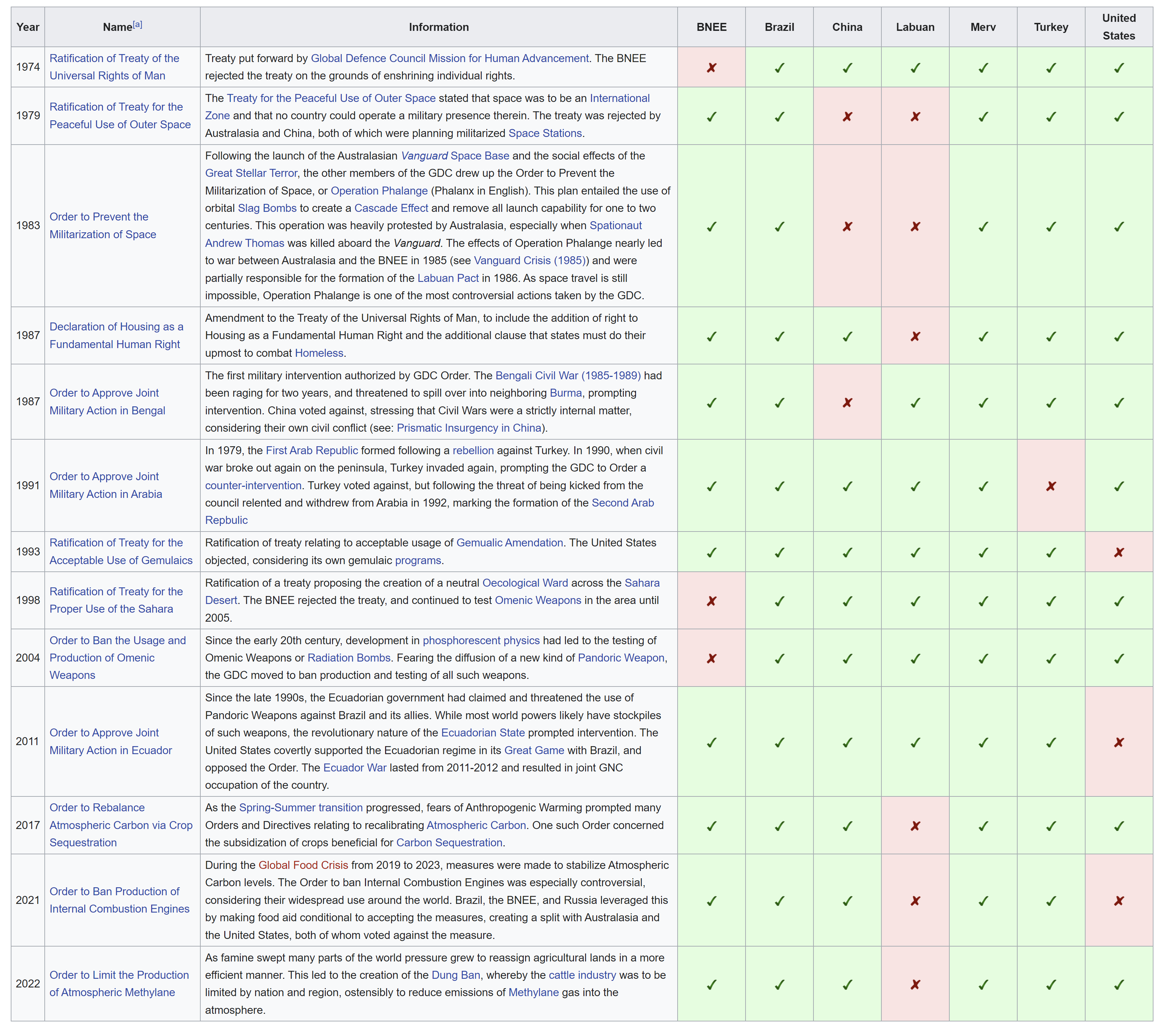
From a Wiki of controversial GDC Orders (5 out of 7 members necessary for ratification)

Last edited:
So how does Ryuku control so many outlying islands (idk if it controlled them when it was independent IOTL) and what interests prompt Buenos Aires to own the Falklands and thr other islands, yet Brazil as continental hegemon has the least useful of them all? Is that a way for Brazil to 'own' them by proxy thru its vassal?
It seems the *UN has a hell of a lot more power
From a Wiki of controversial GDC Orders (5 out of 7 members necessary for ratification)
Dude they literally chose to make it impossible for any utilization of space, this world is insane, Kessler Syndrome on purpose.... makes me appreciate our UN a bit more because at least it can't get itself together and do something this dumb.It seems the *UN has a hell of a lot more power
I'm at a loss for words over how overkill that decision was, no way an anti-satellite missile or kinetic impactor couldn't have been launched to solely destroy the space station and not prevent civilian uses of space. I guess things like stratellites will have to fill in for the loss of orbital infrastructure, GPS and telecommunications satellites aren't going to happen.
Last edited:
Share:

